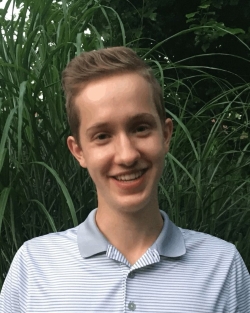


During spring 2021, Nate Roe '23, an electrical engineering major and co-president of the Dartmouth Energy Alliance, left Hanover to work at REEF Technology in Miami. Working in their energy division, he served as an energy engineering intern. But his job title barely scratched the surface of what his work entailed.
"That entailed pretty much everything you can imagine. Some days I was writing code, some days, I was preparing slide decks for executives. Some days, I was creating Excel financial models for tracking electric vehicle charging station grant programs in the United States. So I guess that's to say I sort of wore a lot of different hats," Nate said.
These many hats, Nate believes, are what make the energy industry so engaging. As an electrical engineering student at Dartmouth, his curriculum shared a similar diversity, preparing him for the wide-ranging nature of his internship in the field.
"I think the liberal arts thing is huge," Nate said. "Having the ability to call myself an engineer, who can talk about things like policy, who can talk about things like economics, with a comfort level that a lot of other people at a lot of other schools can't do and to be able to convey my thoughts and judgments about these things related to energy is huge."
Nate put this systems level thinking to work on the biggest project of his internship, a 30-page white paper on electric vehicle charging.
"The white paper was just an absolute beast in terms of forcing me to push my understanding of electrical engineering and computer science in cybersecurity," Nate said. "I looked at the technology associated with vehicle to grid technology associated with demand response, implemented into charging stations and I also looked into the policy associated."
More specifically, Nate was tasked with conceptualizing "how networks as we build them out can be made robust against cybersecurity threats." He explored the OCPP 2.0, or Open Charge Point Protocol, which is "basically the gold standard right now, but I'm sure changes will have to be made."
Nevertheless, Nate believes the paper was fundamental to his experience at REEF.
"I feel like I was revving so hard on that, that I'm very prepared for the future because I was able to accomplish that," Nate explained. "A lot of what happens in the electric vehicle charging space is anticipatory. And I think, beyond anything else, the adaptability associated with energy and wearing all these different hats is something that I definitely take away from the internship. It made me realize that there's an entire world out there that I haven't explored yet."
Going forward, Nate wants to leverage his experiences at Dartmouth and REEF to tackle climate change, one step at a time.
"I think the problem of climate change is something that is here to stay. But I think if you bring energy—particularly the energy that is fostered among Dartmouth students who work on this stuff—to these companies, one: they take notice. But two: I feel like you can inject other people with your energy. Energy is infectious. . . it lets us get problems done," Nate said. "And I think as we tackle really big, scary problems like climate change, it's the passion and the expertise … it's the knowledge fostered in places like Dartmouth that we need to be energy leaders because nobody else is going to step up. So we gotta do it."